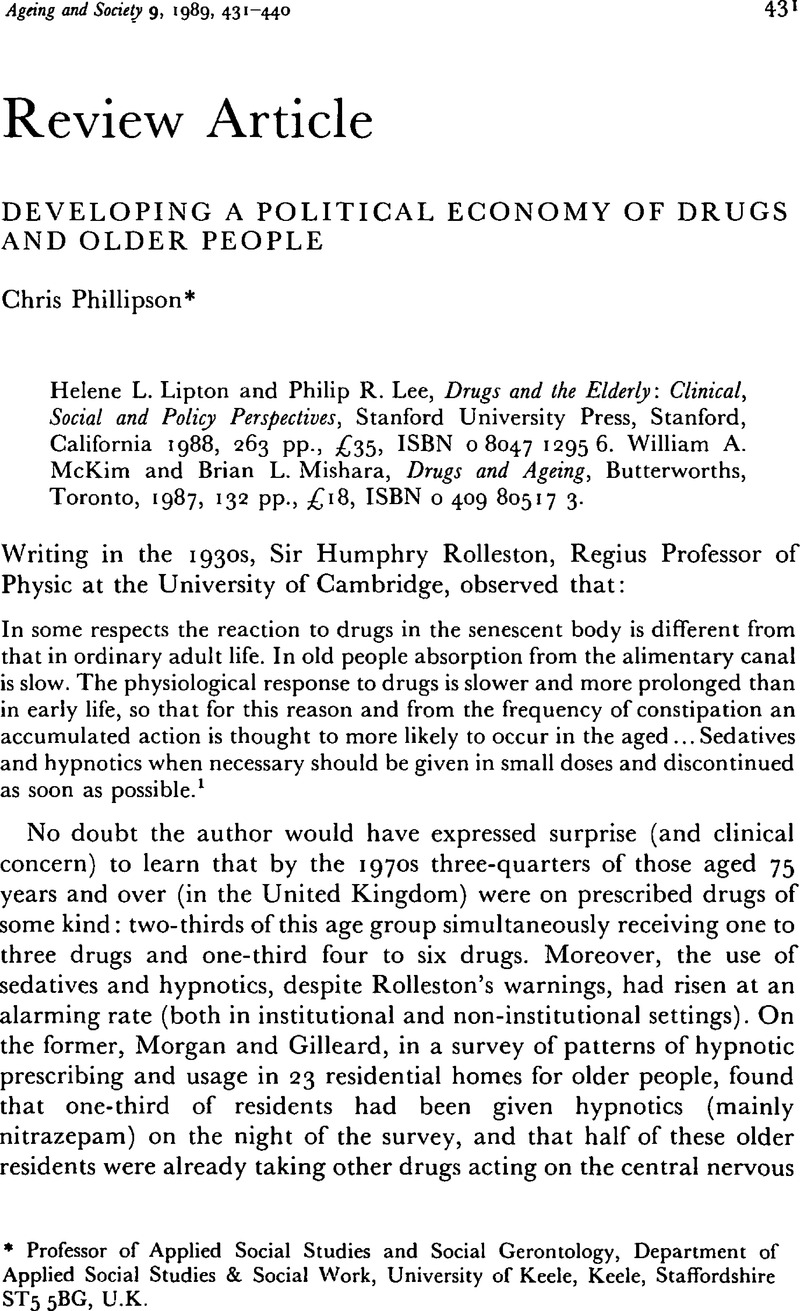Published online by Cambridge University Press: 14 November 2008

1 Rolleston, H.Medical Aspects of Old Age. Macmillan, London, 2nd edn (1932), p. 142.Google Scholar
2 Morgan, K. and Gilleard, C.Patterns of hypnotic prescribing and usage in residential homes for the elderly. Neuropharmacology Journal, 20 (1981), 1355–1356.Google ScholarPubMed
3 Learoyd, B. M.Psychotropic drugs and the elderly patient. Medical Journal of Australia, i (1900), 1131–1133.Google Scholar
4 Burns, B. and Phillipson, C.Drugs, Ageing and Society: Social and Pharmacological Perspectives, Groom Helm, London (1986).Google Scholar
5 Macdonald, E. T. and Macdonald, J. B.Drug Treatment and the Elderly, John Wiley and Sons, Chichester, pp. xi–xii.Google Scholar
6 Cartwright, A. and O'Brien, M. Social class variations in health care and in the nature of general practitioner consultations. In Stacey, M. (ed.), The Sociology of the National Health Service, Sociological Review, Monograph no. 22, London.Google Scholar
7 Royal College of Physicians, Fractured Neck of Femur; Prevention and Management, Royal College of Physicians, London (1988).Google Scholar
8 Cited, in Mental Health of Elderly People, MIND Publications, London (1979).Google Scholar
9 Ibid, p. 47.
10 Zola, I. Medicine as an institution of social control. In Ehrenreich, J. (ed.), The Cultural Crisis of Modern Medicine, Monthly Review Press, New York (1978).Google Scholar
11 For classic accounts of geriatric medicine in the 1940s see: Howell, T.Our Advancing Years, Phoenix House, London (1953)Google Scholar; Stieglitz, E. J.The Second Forty Years, Staples Press, London and New York (1949).Google Scholar
12 Shulman, J.Pills and profits: dealing with the drug companies. Medicine in Society, 9 (1982), 26–31.Google Scholar
13 Medawar, C.The Wrong Kind of Medicine? Consumers' Association and Hodder and Stoughton, London (1984).Google Scholar
14 This area is explored in Burns, B. and Phillipson, C.Op. cit.Google Scholar See also Braithwaite, J.Corporate Crime in the Pharmaceutical Industry, Routledge, Kegan and Paul, London (1984).Google Scholar
15 For a review of rejuvenation techniques see Trimmer, E. J.Rejuvenation: The History of an Idea, Robert Hale, London (1967).Google Scholar
16 Porter, R.Do we really need doctors? New Society, 69 (1987), 87–89.Google Scholar